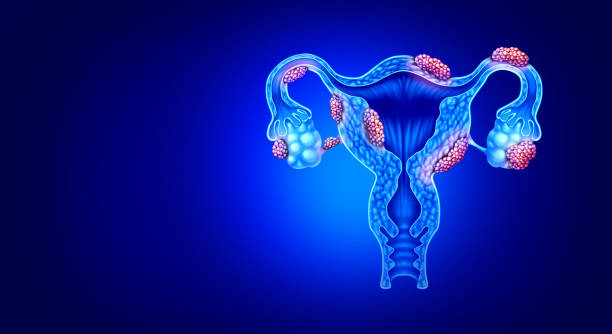Endometriosis: The silent disease that affects not only the body but also the mind of 3.5 million women in Colombia.

Living with constant pain, extreme fatigue, and anxiety has become the silent routine of 3.5 million women in Colombia who suffer from endometriosis, a chronic disease that causes inflammation, intense pelvic pain, and even infertility. Beyond the physical consequences, this condition has a profound emotional impact, affecting the mental health, personal lives, and job stability of those who suffer from it.
In the context of World Mental Health Day, celebrated this October 10, doctors and patients agreed that endometriosis not only represents a medical challenge but also a constant psychological burden. Among the most common emotional symptoms are anxiety, depression, difficulty concentrating, and social isolation.

More than three million Colombian women live with this disease. Photo: TikTok @chr0nically.ill - iStock
The problem is compounded by the fact that diagnosis can take seven to ten years from the onset of symptoms, due to a lack of information and the normalization of intense menstrual pain. This prolonged wait not only delays treatment but also amplifies the psychological consequences.
The World Health Organization (WHO) warns that depression and anxiety limit daily life, interfering with studies, work, and personal relationships. In the case of endometriosis, the pain can become so intense that it disrupts academic or work routines, affecting personal and professional development.
“Chronic pain associated with endometriosis is persistent, disabling, and often limits women even in basic daily activities. Furthermore, the uncertainty and delay in diagnosis increase anxiety, depression, and a deterioration in their quality of life. Therefore, a comprehensive, multidisciplinary approach that responds to the different needs of each patient is essential,” explains Dr. Juan Guillermo Reyes, Director of Medical Affairs at J&J MedTech.

Doctors and patients insist on the need for a comprehensive approach. Photo: iStock
A study conducted at the University of Granada with 230 women diagnosed with endometriosis revealed that half experienced severe fatigue accompanied by anxiety, depression, catastrophic thoughts, sexual dysfunction, poor sleep quality, and feelings of hostility. These symptoms, combined with chronic pelvic pain, severely affect quality of life and make daily tasks difficult, especially those requiring concentration or physical effort.
“Living with constant pain exhausts the mind, disrupts sleep, generates anxiety, hopelessness, and sadness; it saps our energy. It often limits work, affects school, and impacts our social life. But when a woman understands that she is not alone, that her pain is real and deserves to be treated with dignity, she begins to regain control,” says Luz Marina Araque, founding president of the Colombian Association of Endometriosis and Infertility (ASOCOEN).
With the goal of raising awareness about the disease and promoting timely care, Johnson & Johnson MedTech, in partnership with ASOCOEN, has been promoting the #NoEsNormal campaign since 2022, an initiative that seeks to raise awareness among women of reproductive age about the symptoms of endometriosis. According to its promoters, early detection is key to improving quality of life and reducing the emotional impact.

Endometriosis is a condition that many women suffer from without realizing it. Photo: iStock
Experts agree that the most effective response to this disease must be comprehensive, combining early diagnosis, specialized medical care, and emotional support. “Each patient experiences endometriosis differently and requires responses tailored to their experience. Support should be multidisciplinary, and decisions should be made jointly with the patient, periodically reviewed to tailor care to their needs,” says Dr. Reyes.
Psychological intervention, he adds, can make a big difference even when the pain doesn't completely disappear. Empathy, listening, and understanding are just as important as physical treatments.
For Luz Marina Araque, taking care of the mind is as essential as taking care of the body: “Mental health in these cases is as important as physical treatment; we can't heal a body that's constantly on alert without taking care of emotional well-being. I recommend setting clear boundaries, learning to say 'no' to energy-sapping practices, and incorporating tools like conscious breathing or relaxation stretches. A balanced diet also helps stabilize mood.”
Environment and Health Journalist
eltiempo


%3Aformat(jpg)%3Aquality(99)%3Awatermark(f.elconfidencial.com%2Ffile%2Fa73%2Ff85%2Fd17%2Fa73f85d17f0b2300eddff0d114d4ab10.png%2C0%2C275%2C1)%2Ff.elconfidencial.com%2Foriginal%2F5f8%2F279%2Ff3f%2F5f8279f3fe3cf2bf64ad97bcee9a02f2.jpg&w=1280&q=100)
%3Aformat(jpg)%3Aquality(99)%3Awatermark(f.elconfidencial.com%2Ffile%2Fbae%2Feea%2Ffde%2Fbaeeeafde1b3229287b0c008f7602058.png%2C0%2C275%2C1)%2Ff.elconfidencial.com%2Foriginal%2F552%2Fc71%2F067%2F552c71067d366618bb11a58ecff72be9.jpg&w=1280&q=100)
%3Aformat(jpg)%3Aquality(99)%3Awatermark(f.elconfidencial.com%2Ffile%2Fa73%2Ff85%2Fd17%2Fa73f85d17f0b2300eddff0d114d4ab10.png%2C0%2C275%2C1)%2Ff.elconfidencial.com%2Foriginal%2Fad9%2F576%2Fe8c%2Fad9576e8c492ea10bdb668790c1ca8b1.jpg&w=1280&q=100)
